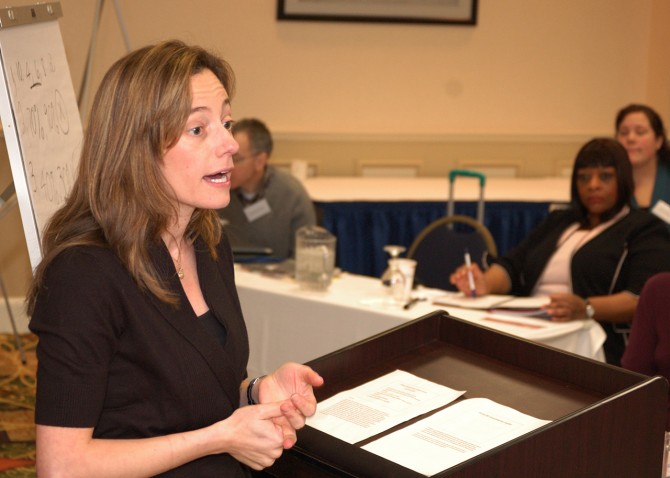Maria Fitzpatrick: understanding human behavior
By Jackie Swift
Maria D. Fitzpatrick is a professor of economics and public policy in the College of Human Ecology and the director of the Cornell Institute for Public Affairs. In September 2020 she was named Cornell’s new associate vice provost for social sciences. In that role, she is helping to further the mission of the Office of the Vice President for Research and Innovation to advance and support Cornell research by promoting scholarship and collaborations throughout the broad landscape of the social sciences.
She also is continuing her own robust research program, focusing on child and family policy and more effective ways to pinpoint child abuse and maltreatment; the role of teachers in child protection; the economics of education; and how economics shapes the way people make life decisions.
Identifying child mistreatment is one of the most difficult aspects of child protection. Often caseworkers have little to go on: Perhaps a neighbor reports excessive shouting in a child’s household. Or perhaps a child arrives late to school, looking disheveled, and tells a teacher that her parents have been fighting. Assessing the situation becomes even murkier if the child is very young. If a 4-year-old says his parents are mad at each other, what should an adult make of that?
“Once a report comes in, a team of caseworkers has to figure out whether or not to go out into the field and investigate,” says Fitzpatrick. “It’s very labor intensive, and child protective agencies are extremely understaffed. The process they use to decide whether to investigate often leads them to spend a lot of energy investigating very low-risk cases while at the same time underinvestigating cases that are actually high risk.”
Algorithms pinpoint children at risk
Fitzpatrick was asked by two county agencies in Douglas County, Colorado, to help them change the way they operate. The agencies were interested in using predictive computer modeling to assist them in pinpointing which child maltreatment reports to investigate. Fitzpatrick joined with then-department colleague Christopher Wildeman, who’s now at Duke University, to set up a trial and evaluation of a predictive machine-learning model created by other researchers.
The model generated a risk score for each child suspected of being maltreated to identify those with the highest risk of future removal from the home over a two-year period, Fitzpatrick says. To come up with the score, the algorithm processed hundreds of variables gleaned from records on the family in question.
“Even though caseworkers had access to most of the same records that the machine-learning model did, they were trying to analyze that data with a human brain, which is much less accurate than the model,” Fitzpatrick says. “The risk score is one more piece of information that can help bring a little clarity to the process.”
The researchers found that use of the risk score information influenced caseworkers’ decisions for the better, making them more likely to investigate the riskiest cases and slightly less likely to investigate the least risky cases, Fitzpatrick says.
Teachers’ roles in child protection
In another project centered on child well-being, Fitzpatrick looked at the role of teachers in identifying and reporting child maltreatment. Together with Cassandra Benson, Ph.D. ’19 (economics), now at the U.S. Air Force Academy, and Samuel R. Bondurant, then a Ph.D. student at Texas A&M who has since graduated and is now at the U.S. Census Bureau, Fitzpatrick used economic and statistical tools to analyze data about child maltreatment reporting. The researchers looked for reporting patterns, as well as changes in reporting connected to whether children were in or out of school – for instance, during summer vacation.
Fitzpatrick and her collaborators found that child maltreatment identification and reporting drops off significantly when children aren’t in school.
“That means there’s probably a lot of maltreatment that’s going unidentified when children aren’t in front of teachers,” Fitzpatrick says. “This suggests we might want to take that into account when we’re designing supports for children and families. We should realize that teachers play this role of reporting child maltreatment, and we should give them the tools to better identify it so they don’t confuse maltreatment with other things, like poverty.”
Although teachers are mandated to report child maltreatment, very few people know that, Fitzpatrick says, and even the teachers themselves aren’t always clear about their role as reporters.
“Right now we have a very hodgepodge system of maltreatment reporting,” she says. “Teachers don’t get much training in it, and they don’t know what services are available to families. We need to help them be better participants in the system.”
Examining the impact of retirement on health
Along with her focus on child and family policy, Fitzpatrick also researches various aspects of retirement. Her 2018 study exploring the connection between retirement and health attracted broad media and news attention.
“There’s an enormous amount of literature looking at whether retirement is good or bad for people’s health,” she says. “It’s a really complex question. The classic idea is that someone who works in a physically demanding job, such as a railroad worker, finds their health improves after they retire because they are no longer doing such backbreaking work. But not many of us do that sort of physical work these days.”
“Many people find their work provides them with engagement, mental and social stimulation, and reasons to get out of the house,” she says. “For those people, retirement might have a negative impact on health.”
Fitzpatrick joined with Timothy J. Moore, associate professor of economics at Purdue University, to address the question of retirement’s effect on health. They analyzed national death certificates in the United States, specifically focusing on people who were 62 years old at the time of death, the age when most first become eligible for social security benefits.
“Because of eligibility, a lot of people retire right at age 62,” Fitzpatrick says. “Among men, 10% retire at that age. If retirement affects health, we thought we might see a change in mortality at that age.”
The researchers, indeed, found a 2% increase in male mortality at age 62. Single men with lower levels of education were affected the most, and the most common causes of death were lung-related conditions such as chronic obstructive pulmonary disease. “That suggests that, for men, on average, early retirement at 62 has pretty severe health consequences,” Fitzpatrick says.
Other research has shown that upon retirement, people become more sedentary and increase negative health behaviors such as smoking. Fitzpatrick and Moore hypothesize that the retired men were not in good health to begin with, and when they indulged in these negative behaviors the adverse health effects hastened their deaths.
“Our findings connecting retirement and mortality aren’t true for everyone,” Fitzpatrick says. “The effect on women, for example, was negligible. But our research shows that some groups should take care in thinking about the transition to retirement. A lot of people prepare for retirement financially and in other ways, but very few think about how they are going to take care of their health.”
Economics as a lens on human behavior
Fitzpatrick’s training is in economics, and her varied research interests illustrate the usefulness of the discipline, she says.
“Most people think economics is either about finance or widgets, but it’s really a paradigm for understanding how people behave, why they make the decisions they do, how they allocate scarce resources like their time and money,” she says. “Economics gives us rigorous methods for analysis and for thinking about the decisions we make on an individual and societal level, and it can help us figure out how to spend our time and resources in ways that are most effective.”
Jackie Swift is a writer for Cornell Research, where this story originally appeared.
Media Contact
Get Cornell news delivered right to your inbox.
Subscribe


